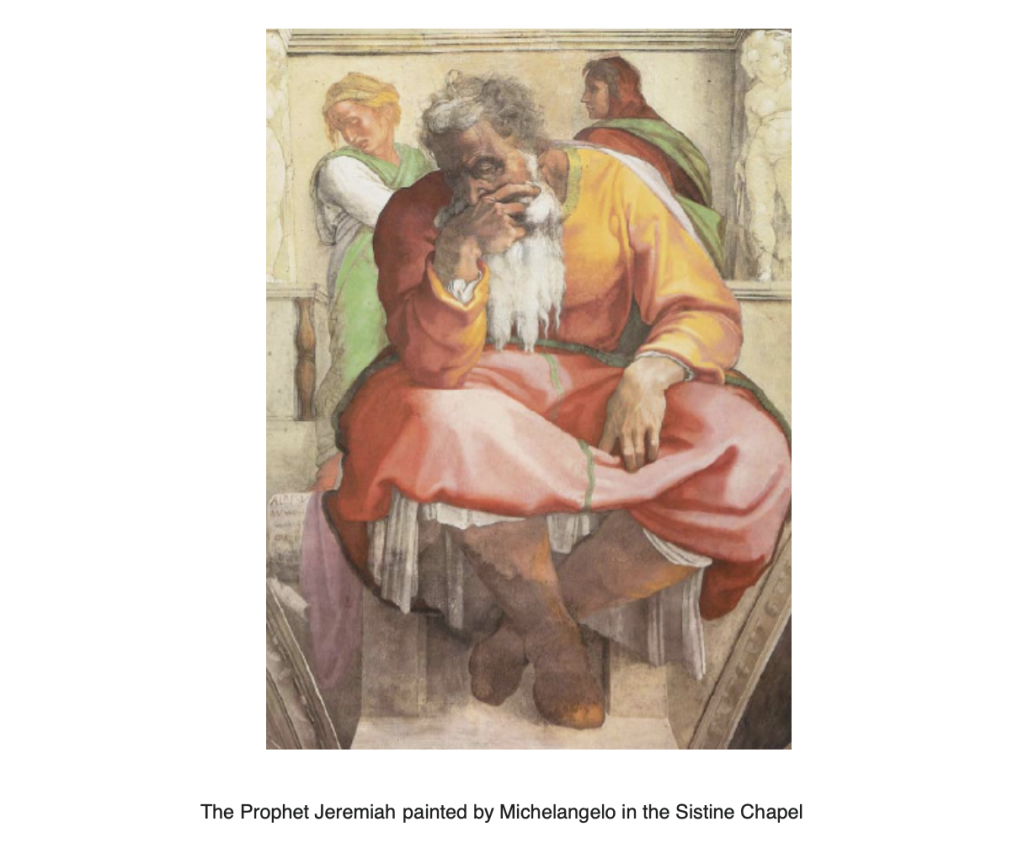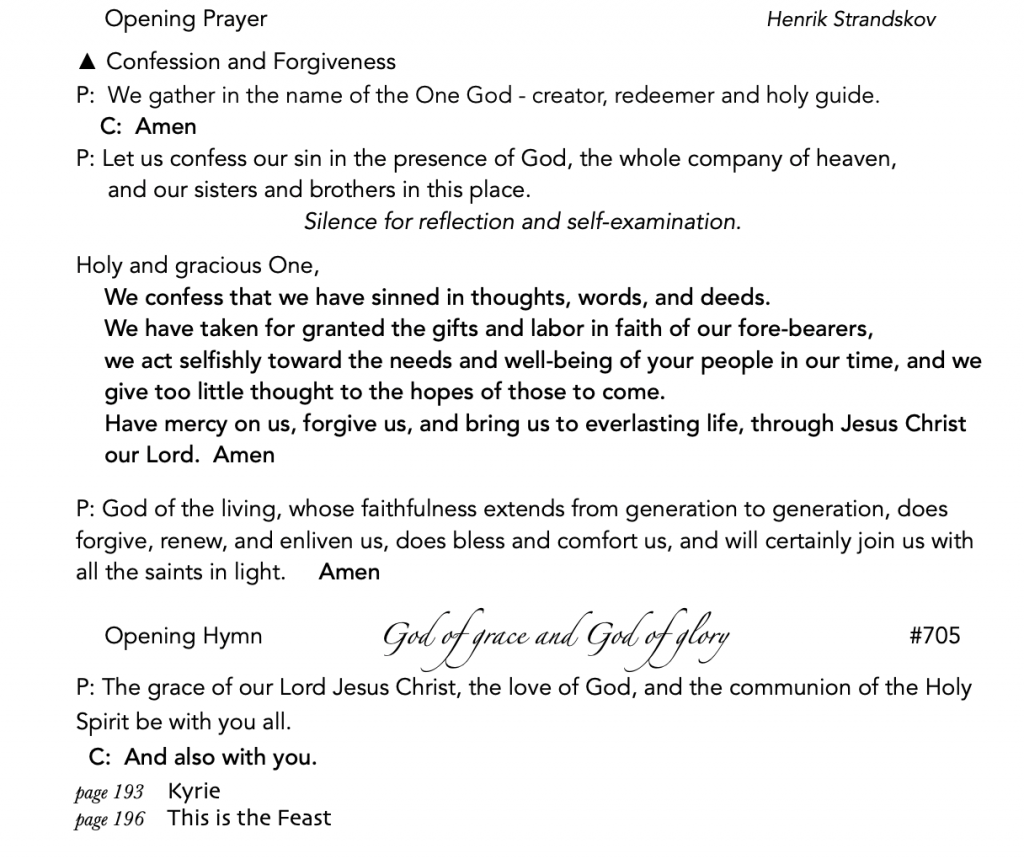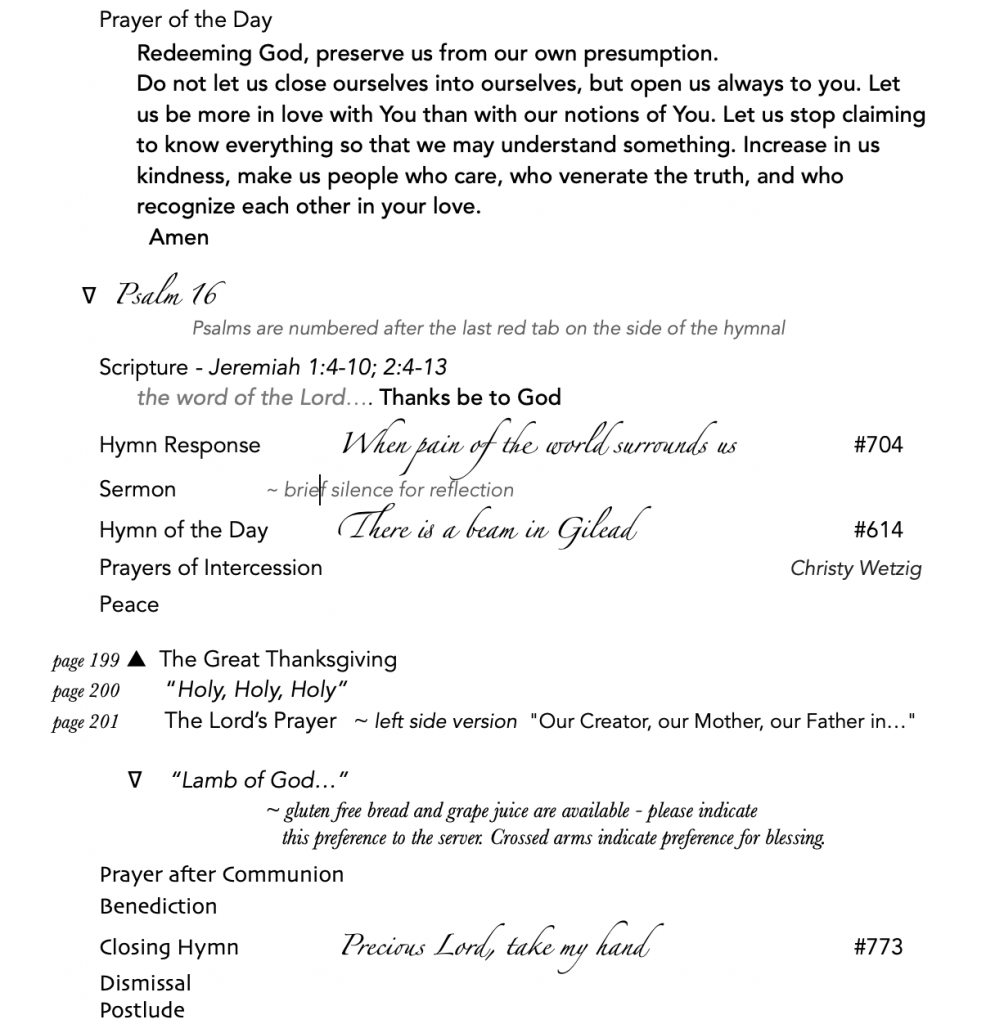


November 19
In terms of context, in both of the church lectioneries (Revised Common and Narrative), the weeks leading into Advent are filled with passages from prophets. The destruction and hopelessness of the kingdoms of Israel and Judah provide a fitting backdrop for the end of the church year, and the promised messiah leads us into Christmas and Jesus’ birth.
This year we’re sticking with Jeremiah. He was a prophet from the southern kingdom of Judah. The northern kingdom, Israel, had already been dismantled by the Assyrians with their practice of dissimilating the conquered people – taking them out of their home lands and dispersing them throughout the conquered lands so that they lost their sense of belonging and community and peoplehood.
Jeremiah is from Judah, but he’s from the northern edge of Judah, from the tribe of Benjamin who culturally and religiously had more in common with the tribes of the northern kingdom than Judah to the south. He is a descendant of Abiathar, one of the two chief priests of King David.
As you might remember, David united the tribes of Israel into one kingdom. Similar to his method of uniting the tribes and nation-states he conquered by taking wives from each of them, he united the two kingdoms religiously by having two chief priests. Jeremiah’s relative was the one from from Israel and associated with worship at Shiloh in the north. The other chief priest was Zadok, from the south, and the two contended for priestly control of royal religion in Jerusalem. It’s very much like the Happy Danes and Holy Danes being brought together here for the first Danish seminary. Good idea, but it didn’t work in practice – religious sensibilities, interpretations and theologies don’t mesh or make allowances for the “other”. Abiathar supported Solomon’s brother to be king after David’s death and so was banished and sent home by King Solomon. And that was the end of the priestly line of Eli.
The passage of time might soften the edges, but not change the attitudes, and cultural animosity lingers for generations. Jeremiah’s strong criticism of the house of David and the royal religion of Jerusalem is due in part to his levitical and Benjaminite heritage. He is not of the house and lineage of David, and through his oracles, presses for a return to the covenant of Moses, to the God who brought them out of Egypt. That’s not really pertinent to today’s reading, but I find it be telling and true. We live in binary systems and can’t seem to free ourselves. Actually, it is pertinent, because God seems to be insisting on it for these people. But we might get back to that later.
Jeremiah is one of the longest books of the Bible. As a prophet, he begins his work in the year 627 BC at the end of Assyrian rule. Judah was a vassal state of Assyria. The battle of Carchemish in 605 brought King Nebuchadnezzar to power and two years later Judah became part of the Babylonian empire. Jeremiah lives through the Babylonian incursions and conquests, was among the poor left behind to tend the land and vineyards for the Babylonian armies after the exile of 587, and eventually, was forced to go to Egypt at the end of the Babylonian era, just as Persia was rising. Jeremiah pronounces the death of one world and the birth of another. His critique become messages of destruction uttered against not only Jerusalem and Judah, but also against Egypt, Gaza (the Philistines), Moab, Ammon, Edom, Syria (Damascus), and Babylon making it clear that God is the God of all nations, whether they know it or not.
So, there’s a lot of dread and doom — years and decades of bad news as he is called upon by God to speak to his people and five successive kings who don’t want to hear any of it. Bad news from God is always unpopular, but is treason in times of national threat. To hear that God is using your enemies against you? This was Jeremiah’s calling.
The hopeful element is that through Jeremiah, the people learned that God was still engaged with them and had a plan for their future, a new covenant that would be written upon their hearts.
We begin at the beginning of the book today – two passages: the first regarding Jeremiah’s call from God, the second, God’s rationale for bringing devastation on the chosen people.
Jeremiah 1:4-10
1:4Now the word of the Lord came to me saying, 5“Before I formed you in the womb I knew you, and before you were born I consecrated you; I appointed you a prophet to the nations.” 6Then I said, “Ah, Lord God! Truly I do not know how to speak, for I am only a boy.” 7But the Lord said to me, “Do not say, ‘I am only a boy’; for you shall go to all to whom I send you, and you shall speak whatever I command you, 8Do not be afraid of them, for I am with you to deliver you, says the Lord.” 9Then the Lord put out his hand and touched my mouth; and the Lord said to me, “Now I have put my words in your mouth. 10See, today I appoint you over nations and over kingdoms, to pluck up and to pull down, to destroy and to overthrow, to build and to plant.”
And from chapter 2, Jeremiah’s message:
2:4Hear the word of the Lord, O house of Jacob, and all the families of the house of Israel. 5Thus says the Lord: What wrong did your ancestors find in me that they went far from me, and went after worthless things, and became worthless themselves?
6They did not say, “Where is the Lord who brought us up from the land of Egypt, who led us in the wilderness, in a land of deserts and pits, in a land of drought and deep darkness, in a land that no one passes through, where no one lives?”
7I brought you into a plentiful land to eat its fruits and its good things. But when you entered you defiled my land, and made my heritage an abomination.
8The priests did not say, “Where is the Lord?”
Those who handle the law did not know me; the rulers transgressed against me; the prophets prophesied by Baal, and went after things that do not profit.
9Therefore once more I accuse you, says the Lord, and I accuse your children’s children.
10Cross to the coasts of Cyprus and look, send to Kedar and examine with care; see if there has ever been such a thing. 11Has a nation changed its gods, (even though they are no gods)? But my people have changed their glory for something that does not profit.
12Be appalled, O heavens, at this, be shocked, be utterly desolate, says the Lord, 13for my people have committed two evils: they have forsaken me, the fountain of living water, and they have dug out cisterns for themselves, cracked cisterns that can hold no water.”
“What wrong did your ancestors find in me that they went far from me, and went after worthless things, and became worthless themselves?
…my people have changed their glory for something that does not profit.…they have forsaken the fountain of living water and instead have dug out cracked cisterns that can hold no water.”
I mean… ouch.
There is a lot of Jeremiah that seems far away and long ago, and then there are lines like these that jump out of the pages and feel like they could be written by one of our own poets about our own time.
We’ll talk about that.
The first thing I want us to notice together, however, is the tone of God’s words. God is the one who forms – intricately creating life, who creates systems and inter-species interconnections that we are only now beginning to comprehend – trees and microbes and the universe beneath our feet, dark energy beyond our earth – this same God grieves the wandering away of her people, their turning away to the distractions and pleasures that prove to be worthless… or worse. It is this grieving God who sends human agents (foreign nations as well as prophets) “to pluck up and to pull down, to destroy and to overthrow,” and also, in the fullness of time, “to build and to plant,” to begin again.
There is a strain of philosophy and religious thought that states that God must be immutable and impassible – unchanging and unmoved – the “unmoved Mover”, in Aristotle’s terms. This concept of God was taken into Christian thought by Thomas Aquinas – and, notably rejected by Martin Luther and other reformers. It may be that God does not experience human emotions – outside of the incarnation – but God IS compassion, IS love, IS pathos, IS righteous retribution. God IS these things that are human emotions in a fullness we can’t fathom or experience. God is the One from whom all things flow. So, to say God grieves over the wayward people, is to speak our truth – perhaps projected, but still believing that the God who IS I AM is involved in this human venture and therefore vulnerable and changeable within the divine, living BEING because of us. That is the instigation for the incarnation of God. Why else would God care, if God didn’t care?
Jürgen Moltmann is a German theologian and writer of books such as Theology of Hope, The Crucified God, and God in Creation – all on my bookshelves — who writes,”A God who is incapable of suffering is a being who cannot be involved. Suffering and injustice do not affect him. And because he is so completely insensitive, he cannot be affected or shaken by anything. He cannot weep, for he has no tears. But the one who cannot suffer cannot love either. So he is a loveless being. Aristotle’s God cannot love; he can only be loved by virtue of his perfection and beauty… in this case, the “unmoved Mover” would be a “loveless Beloved.”*
I stress this point because, if God is an “unmoved Mover”, then these passages and biblical books depict a distant God playing chess with human life and history. And, if God is unmoved by the human predicament, where would be the motivation for divine redemption? Jesus isn’t the face of that kind of God, I would maintain, but is the face of one who is completely invested in human life and welfare. One who is worthy and receptive of our love and worship and prayer.
This all matters as we read the prophetic oracles announcing God’s judgment and destruction coming through the nations from God’s hand. It’s hard to make sense of it in any event, but I think it is necessary to read it with pathos on God’s part – genuine emotional engagement.
“12Be appalled, O heavens, at this, be shocked, be utterly desolate, says the Lord, 13for my people have committed two evils: they have forsaken me, the fountain of living water, and they have dug out cisterns for themselves, cracked cisterns that can hold no water.” This is not petty whining about being ignored; there is anguish and longing and deep frustration in God’s words. God is forsaken, bereft.
The other thing, that only sort of helps, is to realize that God’s ways are not our ways, nor is her timeline our timeline. Scripture helps us see that generations are sometimes simply place keepers, and that the promise is for another generation, perhaps one net yet born. That’s a really hard word for those of us who pray for specific things, specific people, specific change in our lifetime. But it is here, in these stories. Moses led a generation of Israelites in circles in the Sinai peninsula for 40 years. It was the next generation who were to receive the promised land, not any of those who were led out of slavery. In Jeremiah, God makes promises to the remnant who will survive the Exile and captivity, but mostly the promise lies out beyond them for restoration and return. In Jewish understanding, the Messiah, the Christ, (it’s the same word but in Hebrew and Greek), is always the “one who is to come.” It is the promise of justice, redemption, salvation always on the horizon, not now, not here. The kingdom is always coming. That is true in Christianity, too, and why we celebrate Advent. It is the expectation for Christ to come again, to bring in the fulness of the kingdom, the complete way and reign of God. So, in the meantime, one generation – or even more than one – suffers for the sake of future people’s benefit, for blessings they will never see.
When we read the Old Testament books, it is always in layers – some parts written looking forward with the message the prophet receives, some written looking back, with the prophet or others interpreting what was received in light of what they experienced. They see God equally at work in it all, frontwards and backwards. We make sense of our lives that way, too. Things often make more sense from hindsight.
And like Jeremiah we might be helped to remember that we are put into the middle of an ongoing story. We enter a world we didn’t create. We grow into a life already provided for us. We find ourselves in complex relationships with other wills and motives that began their trajectory before we are introduced. We are living in the middle of a story looking forward and back, surrounded by God, but barely, if at all, aware of that presence.
“What wrong did your ancestors find in me that they went far from me, and went after worthless things, and became worthless themselves?
There is a sting to these words, lo, these many centuries later. It implies that the current generation is acting, and soon to be acted upon, out of ignorance. We, too, know that we go after worthless things that seem important at the time. We fill our time with worthless, often mindless endeavors, and our homes and spaces with perhaps expensive, but, ultimately valueless stuff. We are busy with distractions. Busy with thoughts that lead us into dark corners or spiraling ruts. We’re busy trying to keep up pretensions of happiness or success or life satisfaction when nothing is further from the truth. We’re miserable and know it, but won’t admit it or show it. We could change things, shift our values and the way we value time, relationships, money, emotions, faith. We could – probably – do that and be better for it, happier, more valuable as friends and family members, better disciples of Jesus and the values we learn from his gospel. But admitting that we’ve got the wrong end of the stick and have been dragging it along, struggling to pull it or push it or manage it takes too much courage – because then we’d have to refocus, shuffle all the cards and re-deal, and that’s kind of horrifying.
We can change, but it’s often only when we have to – like the Man’s Prayer from Red Green: “I’m a man—but I can change—if I have to—I guess.” It’s usually illness or injury or a pandemic that forces a change of lifestyle and values. And we’re eager to get back to the way things were before. The words of a prophet didn’t seem to effect change in Jeremiah’s day, any more than they do in ours.
“…my people have changed their glory for something that does not profit.…they have forsaken the fountain of living water and instead have dug out cracked cisterns that can hold no water.”
It’s hard to know what being faithful even means in our world today. I think it means being engaged in the forces we see for good, in trusting that, somehow, God will see it through; that we emphasize care for others over our own momentary wishes or distractions. If we consistently act with kindness and treat people with justice and remind ourselves that we are not God, but are, in fact, desired by God, and redeemed by the once and future messiah who is always coming, just on the horizon, then maybe that is at least the basics of living within God’s grace.
May the fountain of living water sustain you and keep you coming back to its source.
Pastor Linda
*Jürgen Moltmann, The Crucified God: The Cross of Christ as the Foundation and Criticism of Christian Theology, trans. R. A. Wilson and John Bowden (New York: Harper & Row, 1974), 222.